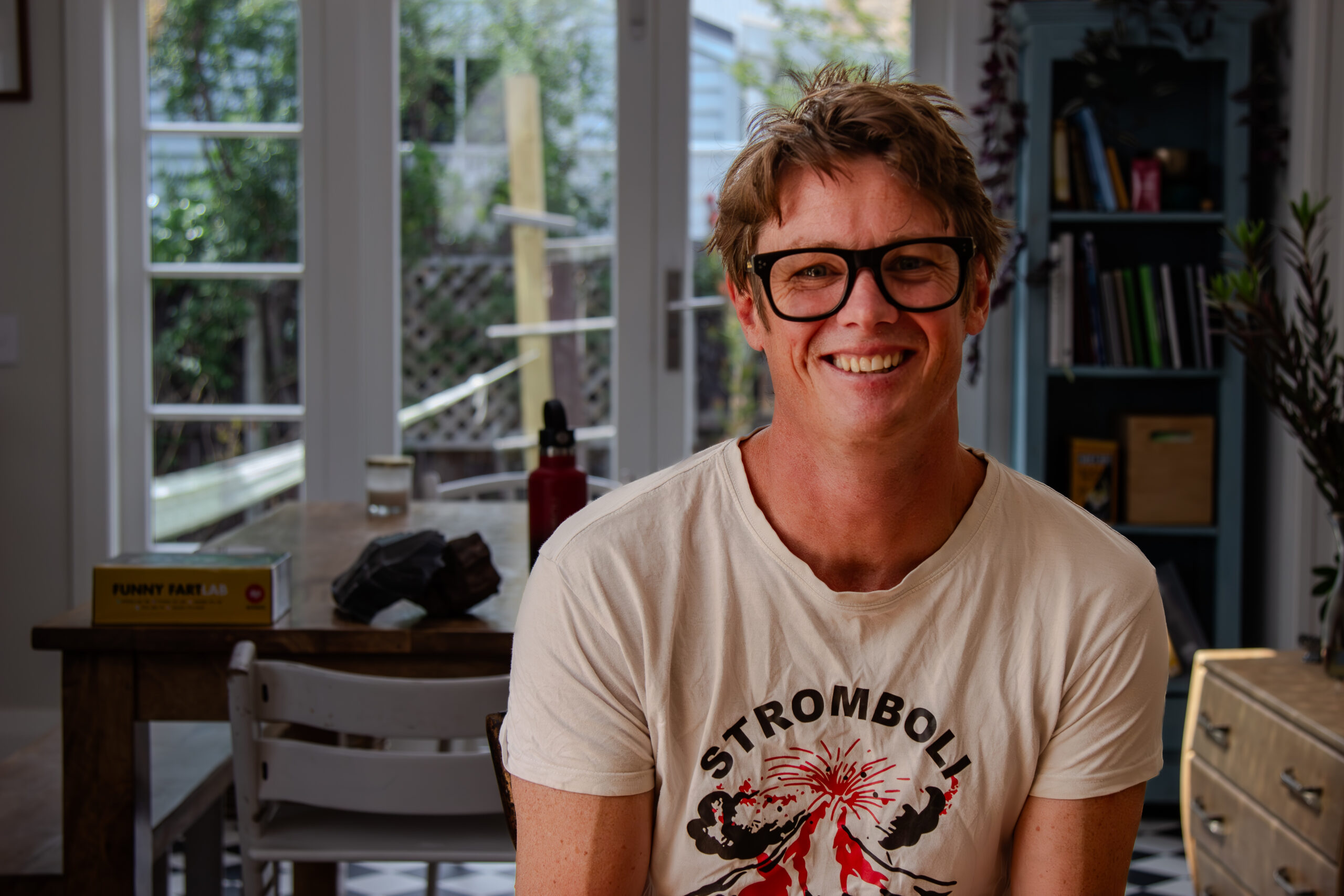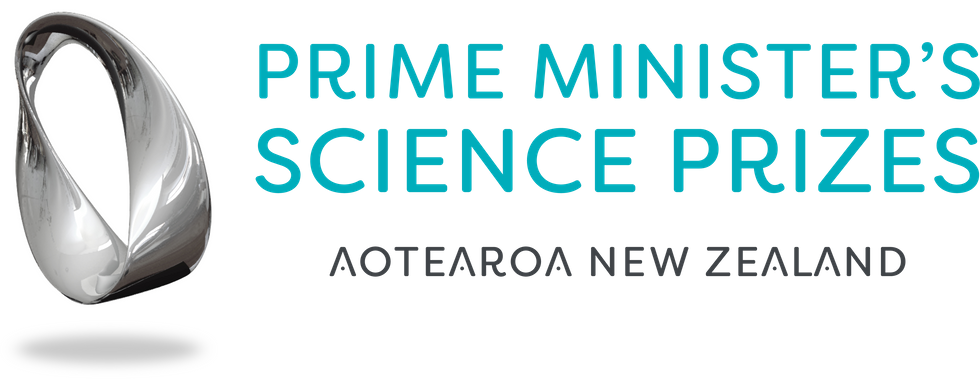“Volcano Dad” wins Prime Minister’s Science Communication Prize

MEDIA RELEASE: 2023 TE PUIAKI WHAKAPĀ PŪTAIAO SCIENCE COMMUNICATION PRIZE
2023 Prime Minister’s Science Communication Prize winner Professor Ben Kennedy says he has a responsibility to teach the wonder and the risks of volcanoes to people young and old.
A volcanologist, Ben is a Professor at the University of Canterbury’s School of Earth and Environment, Faculty of Science, and a prolific science communicator.
Many years ago, if you were looking for 8-year-old Ben, you would have found him “banging rocks together and dreaming of dinosaurs and volcanoes” at the local quarry. Now you can still find him doing the same thing – and passionately teaching the public about volcanoes.
He is known by local children for the volcanoes he painted on his fence, and he rarely leaves the house without a volcanic rock to show people.
He says he realised the importance of communicating his science to others during his PhD. He initially took the tack of focusing on tamariki, who will need scientific knowledge and skills – and the trust in science that results from understanding – to handle the challenges facing our world.
Ben completed a Science Media SAVVY workshop with the Science Media Centre at the beginning of his research career in Aotearoa, which he says “opened the doors” for him to communicate his science with people in New Zealand.
Much of Ben’s original communications approach came from natural play and storytelling with his own children, or during “Volcano Dad” visits to their schools.
These ideas grew into research projects on science communication where these ideas were reinvented, researched, and tested further. The methods of science communication that Ben and his team now use are deliberate and based on research.
Ben and his research team found that tamariki can be motivated by inclusive methods such as art and storytelling, games and puzzles, and virtual fieldtrips.
In one of his most wide-reaching projects, Ben teamed up with his brother to create a documentary, Lava Chasers, which involved filming experiments with scooping lava out of active lava flows in Hawaii.
Ben has also made appearances on the children’s television show What Now and has contributed to other travel and science documentaries, such as The World’s Most Scenic Railway Journeys and Beneath New Zealand.
When Whakaari White Island erupted on the 9th of December 2019, Ben was thrust into what he describes as a “media frenzy”, with the public wanting answers.
“The Whakaari tragedy was and still is a bit of an emotional swirl with me. I love Whakaari. I worked there for ten years. I thought that it was a beautiful, exciting volcano.”
Ben was in London when his phone rang in the middle of the night and he was told about the eruption, and that there were people on the island when it happened.
Ben says he knew people had died, but he was initially unaware that the lives of people he considered friends had been taken in the eruption.
“More information gradually kind of trickled in. People had died. People I knew had died. People I knew were involved with looking for bodies on the island… So, there’s this big, complicated situation.”
He says people, including international media, wanted to know who or what to blame – and they were asking him.
“I didn’t really know. I didn’t have any of the answers. I didn’t really know how I felt about the whole situation. So that was tricky. I had to take it slowly. I had to talk to people involved, to listen to the people involved, and try to do my best communicating that.”
Ben appeared in several “stressful and emotional” live TV and radio interviews, including on the BBC’s World Service. But after this, Ben says he had to take a step back from communicating for a few months, carefully thinking about his approach.
Whakaari’s eruption forever changed the way Ben communicates science: “I have to take the whole thing much more seriously now. I have to take people’s emotions into account much more than I would have previously. I’m a lot more thoughtful and maybe a bit slower and calmer in my approach to science communication”.
Ben says his goal was no longer to enthusiastically entice kids and the public to engage with science, but instead to draw attention to the complex interaction between science and society, and to do so with compassion.
“I also needed to provide honest answers to those who needed them. I learnt that volcano science communication has to be inclusive and sensitive, and that it works best when it integrates the expertise and experiences of a broader scientific and local community.”
“One way that I could combine the fun aspect of things blowing up and the serious aspect of talking to people and communities was this idea of VolcanoFest. It was a way of bringing volcano scientists and science communicators together with the Kiwi public.”
VolcanoFest ran alongside the global conference of the International Association of Volcanology and Chemistry of the Earth’s Interior, which was held in Rotorua in early 2023. Over 900 scientists from 41 countries attended, brining world-class scientists, locals, and rangatahi together.
The VolcanoFest event allowed people to meet volcanologists, ask questions, and learn more about the world beneath their feet.
Ben says scientific conferences have a reputation of inaccessibility: scientists speaking to each other about the details of their science, without giving back or engaging with the local community – “I was determined that my brainchild, VolcanoFest, would start to remedy this.”
Despite the irreversible changes Whakaari made to Ben’s approach to science communication, he says he still finds it incredibly rewarding to teach children about volcanoes: “The kinds of emotions you receive from kids are magic.”
“I want to share my enthusiasm and my passion for volcanoes. And I think you find a lot of people are also similarly excited and passionate about volcanoes.”
With this prize, Ben plans to use the innovative approaches to teaching and learning exhibited in VolcanoFest to contribute energy, expertise, and funding towards two projects that will raise awareness of both the “wonder and the risks” of volcanoes.
He’ll develop tailored communications for the “Haos-Blong Volcano” museum on Tanna Island in Vanuatu, and for the Visitor Centre at Tongariro National Park. In Vanuatu, he’ll work with volcanologists, local guides, and the team who monitor geohazards. In New Zealand, he’ll collaborate with the Department of Conservation, Ngāti Tūwharetoa, and GNS Science to design innovative ways to communicate with tamariki from local kura.
Ben says that by using his research and the lessons from Whakaari, he and his colleagues can provide expertise in clear and consistent messaging at both locations. Both projects are designed to make a difference by optimising communications for the people who need them most.
In awarding this prize, the expert members of the selection panel were impressed with Ben’s thoughtful and mature approach to science communication. They believe that the benefit of his work will be wide-reaching – both in Aotearoa New Zealand and the Pacific.
They say Ben clearly understands and values the investment required to build genuine relationships with mana whenua and other communities, and his collaborative approach is inspiring and positions him to be a leader in how we reimagine hazard communication following the tragic events on Whakaari.
Ben says this award is not only for him, but for the “diverse community of great people” that work alongside him.
